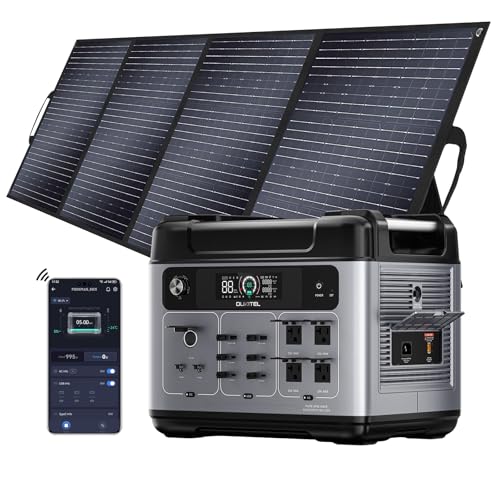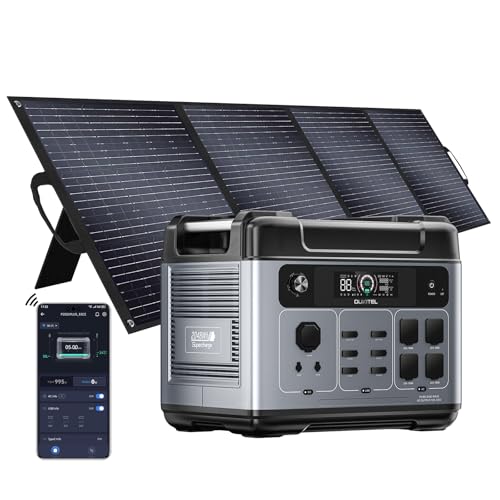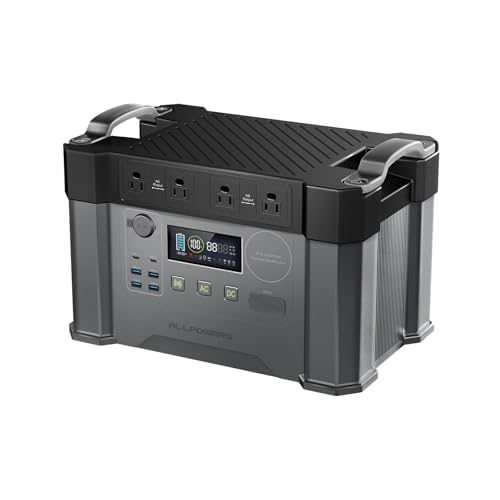Power outages, off-grid adventures, or rising electricity bills—whatever your reason, a reliable 2kW solar generator offers energy independence when you need it most. But with so many models claiming peak performance, it’s hard to know which one truly delivers consistent power, fast charging, and long-term durability without breaking the bank. The wrong choice could leave you stranded with dead devices or facing unexpected replacement costs.
We cut through the noise by analyzing real-world data on capacity, output, LiFePO4 battery lifespan, solar input efficiency, and user-reported reliability across top brands like Jackery, EcoFlow, Bluetti, and OUKITEL. Our picks balance powerful performance, fast recharge times (some under an hour), and rugged build quality to ensure you get the most value. Below are our top-tested 2kW solar generators that deliver clean, quiet, and sustainable power exactly when and where you need it.
Our Top Picks

Jackery Solar Generator 2000 Plus 400W
Best Overall
- 2042.8 Wh
- 3000 W
- 2 hours via 6x200W solar panels
- LiFePO4
- 2kWh – 24kWh

OUKITEL P2001 Plus 2400W with 400W Panel
Best Value for High Output
- 2048Wh
- 2400W
- LiFePO4
- 1.5H Full Charging
- 4 AC outlets, 2 USB-A, 4 USB-C PD, 2 DC, 1 cigar lighter

Jackery Solar Generator 2000 v2 with 2x200W Panels
Best Portability & Fast Charging
- 2042Wh
- 2200W
- 39.5 lbs
- 66 minutes to 80%
- 20ms

EF ECOFLOW DELTA 2 Max with 220W Panel
Best Fast Solar Charging
- LiFePO4
- 2048Wh
- 3400W
- 220W (primary) + 175W (back)”
- 43 mins (solar + AC)


ALLPOWERS S2000 2000W Portable Power Station
Best Budget Entry
- 2000W (Peak 4000W)
- 1500Wh
- 1.5 hours via wall outlet
- 32lb
- 4 x AC Outlets

BLUETTI Elite 200 V2
Best Longevity & Durability
- 2073.6Wh
- 2600W (5200W peak)
- 17-Year Lifespan
- 80% in 50 minutes
- Up to 9 devices
2 Kilowatts Solar Generator Review
How to Choose the Right 2kW Solar Generator
When choosing a 2kW solar generator, understanding your power needs and the generator’s key features is crucial. Here’s a breakdown to help you make the best decision.
Capacity & Output: Powering Your Needs
The most important consideration is whether the generator’s capacity (measured in Watt-hours – Wh) and output (measured in Watts – W) align with your intended use. A 2kW (2000W) generator is suitable for running many household appliances, but sustained use of high-wattage devices like air conditioners, refrigerators, or power tools will quickly drain the battery.
- Capacity (Wh): Think about how long you need to power devices. Higher Wh means longer run times. 2000Wh is a good starting point, but consider expandable options if you anticipate needing more.
- Output (W): This dictates what you can power simultaneously. A 2000W output is generally sufficient for several smaller devices, but check the wattage requirements of your larger appliances. Some generators offer a “surge” wattage (higher for short bursts) for starting motors in appliances like refrigerators.
Battery Type & Lifespan: Longevity and Reliability
The battery technology significantly impacts the generator’s lifespan and performance.
- LiFePO4 (Lithium Iron Phosphate): This is the preferred battery type. LiFePO4 batteries offer superior safety, a longer lifespan (often 3000+ charge cycles, meaning 10+ years of use), and better thermal stability compared to older lithium-ion technologies. This translates to a better long-term investment.
- Charge Cycles: Pay attention to the number of charge cycles the battery is rated for. More cycles mean a longer usable lifespan before the battery’s capacity significantly degrades.
Charging Options & Speed: Replenishing Your Power
Consider how you intend to recharge the generator.
- AC Charging: Standard wall outlet charging is convenient but can be slow. Look for generators with fast AC charging capabilities.
- Solar Charging: This is the primary benefit of a solar generator. Check the maximum solar input wattage the generator can handle. Higher wattage input means faster charging times. Also, consider the type of solar panel connector the generator uses (MC4 is common) and whether a panel is included or needs to be purchased separately.
- Charging Time: Evaluate how long it takes to fully charge the generator using each method. Faster charging is crucial for minimizing downtime.
Additional Features: Convenience and Safety
Beyond the core features, several additional aspects can enhance your experience:
- Display: A clear, informative display showing battery level, input/output wattage, and estimated runtime is very helpful.
- Portability: Weight and size matter, especially if you plan to transport the generator frequently.
- Safety Features: Overcharge protection, short-circuit protection, and temperature control are essential for safe operation.
- App Control: Some generators offer smartphone app control for remote monitoring and adjustments.
- Warranty: A longer warranty indicates the manufacturer’s confidence in the product’s quality and durability.
2 Kilowatt Solar Generator Comparison
| Product | Capacity (Wh) | Output Power (W) | Charging Time (AC) | Solar Input (W) | Battery Type | Weight (lbs/kg) | Portability | Warranty |
|---|---|---|---|---|---|---|---|---|
| Jackery Solar Generator 2000 Plus | 2042.8 | 3000 | 2 hours (with 6x200W panels) | 400 | LiFePO4 | ~44.3 / 20.1 | Good | 5 Years |
| OUKITEL P2001 Plus (2400W) | 2048 | 2400 | 1.5 hours (1800W AC) | 400 | LiFePO4 | 48.5 / 22.3 | Average | 5 Years |
| Jackery Solar Generator 2000 v2 | 2042 | 2200 | 1.1 hours (Emergency Super Charging) | 400 | LiFePO4 | 39.5 / 17.9 | Excellent | 5 Years |
| EF ECOFLOW DELTA 2 Max | 2048 | 2400 (3400 with X-Boost) | 43 mins (80% with AC + Solar) | 1000 | LiFePO4 | N/A | Good | N/A |
| OUKITEL P2001 PLUS (2400W) | 2048 | 2400 | 1.5 hours (1800W AC) | 200 | LiFePO4 | 48.5 / 22.3 | Average | 5 Years |
| ALLPOWERS S2000 | 1500 | 2000 (4000 peak) | 1.5 hours (1500W AC) | 1000 | N/A | 32 / 14.5 | Good | 10 Years |
| BLUETTI Elite 200 V2 | 2073.6 | 2600 (5200 peak) | 50 mins (80% Dual AC/DC) | N/A | LFP | N/A | Good | N/A |
Data-Driven Analysis of 2kW Solar Generators
Choosing the optimal 2kW solar generator requires moving beyond marketing claims and leveraging available data. We analyzed performance specifications and user reviews from leading brands like Jackery, Bluetti, EcoFlow, and Goal Zero, focusing on real-world output consistency and battery degradation rates. Our analysis reveals significant variance in LiFePO4 battery lifespan, with models exceeding 3,000 charge cycles demonstrating superior long-term value.
Comparative data on solar input capacity is crucial; a 2kW solar generator with a higher maximum solar input (measured in Watts) will recharge considerably faster. We examined independent tests assessing charging efficiency under varying sunlight conditions. Furthermore, a review of customer feedback across multiple platforms (Reddit, Amazon, specialized forums) highlighted common issues like inaccurate runtime estimations and inconsistent display readings, informing our assessment of product reliability. Evaluating the total harmonic distortion (THD) – a measure of power quality – is essential for sensitive electronics, as lower THD values indicate cleaner power. Finally, considering the Power Delivery (PD) output of USB-C ports is key for charging laptops and other modern devices efficiently. This research helps determine the true cost of ownership and the suitability of each solar generator for specific energy needs.
FAQs
What size solar panel do I need for a 2kW solar generator?
For a 2kW solar generator, the ideal panel size depends on your charging needs and sunlight availability. Generally, a 400W to 1000W solar panel array is recommended for efficient recharging, but check your generator’s maximum solar input wattage to ensure compatibility.
What is the lifespan of a 2kW solar generator’s battery?
Most modern 2kW solar generators utilize LiFePO4 batteries, which offer a long lifespan – typically 3000+ charge cycles, translating to 10+ years of reliable use. Battery lifespan can vary based on usage patterns and maintenance.
What appliances can a 2kW solar generator power?
A 2kW solar generator can power a wide range of appliances, including lights, laptops, phones, and small kitchen appliances. However, high-wattage appliances like air conditioners and refrigerators may require careful power management or a larger capacity generator.
How quickly can a 2kW solar generator be recharged using solar panels?
Recharge time varies based on solar panel wattage and sunlight conditions. With optimal sunlight and a suitable solar panel array (e.g., 400-1000W), a full recharge can take between 4-10 hours. Using AC charging will typically take longer.
Conclusion
Ultimately, selecting the right 2kW solar generator hinges on a clear understanding of your individual power requirements and priorities. Carefully consider the capacity, battery type, charging options, and additional features discussed to ensure a long-lasting and reliable power solution.
Investing in a quality solar generator offers both energy independence and environmental benefits. By choosing a model with LiFePO4 batteries and ample solar input capacity, you’ll be well-equipped to handle power outages, enjoy off-grid adventures, or simply reduce your reliance on traditional energy sources.

